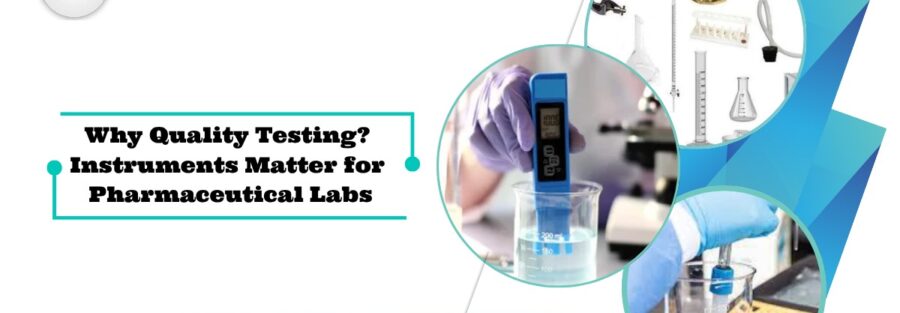Why Quality Testing Instruments Matter for Pharmaceutical Labs
In the pharmaceutical industry, quality is non-negotiable. Every drug, vaccine, or medical formulation that reaches the market must be safe, effective, and of the highest standard. Achieving this level of quality depends not only on the raw materials and research processes but also on the quality testing instruments used in laboratories. Without accurate and reliable instruments, even the best research and development efforts can lead to inconsistent or unsafe results.
Pharmaceutical labs play a critical role in ensuring that every product meets stringent regulatory and safety requirements. From initial drug discovery to final quality control checks, quality testing instruments ensure accuracy, compliance, and trustworthiness. In this blog, we’ll explore why these instruments are crucial, the types of equipment involved, how they affect compliance, and what to look for when choosing them.
The Importance of Quality Testing in Pharmaceuticals
Pharmaceutical products directly impact human health. A minor error in testing or quality control can lead to severe consequences, including health hazards, product recalls, or regulatory penalties. For this reason, every pharmaceutical lab invests heavily in advanced quality testing instruments to ensure:
-
Accuracy:
Reliable measurements help detect even the smallest deviations in formulations.
-
Consistency:
Every batch of a drug must meet the same quality standards.
-
Compliance:
Regulatory bodies like the FDA, WHO, and ICH require that all drugs undergo rigorous testing.
-
Safety:
Effective testing ensures that no harmful or unstable compounds enter the market.
How Quality Testing Instruments Impact Pharmaceutical Labs
1. Ensuring Compliance with Global Standards
Regulatory frameworks such as Good Laboratory Practice (GLP) and Good Manufacturing Practice (GMP) emphasize strict adherence to quality protocols. Instruments used for testing must be certified, calibrated, and validated to meet these guidelines. Without high-quality instruments, passing regulatory audits can become challenging.
2. Enhancing Accuracy in Research and Development
In pharmaceutical R&D, precision is everything. Instruments like high-performance liquid chromatography (HPLC), spectrophotometers, and analytical balances ensure exact measurements of drug compounds, reducing the chances of formulation errors.
3. Speeding Up the Testing Process
Advanced testing instruments, especially those integrated with automation and AI, speed up analysis while minimizing human error. For example, automated dissolution testers or robotic liquid handlers can process multiple samples simultaneously, saving time during large-scale testing.
4. Reducing Operational Costs
While high-quality instruments require initial investment, they significantly lower operational costs by minimizing downtime, maintenance issues, and repeat testing due to inaccuracies.
5. Building Consumer and Regulatory Trust
Pharmaceutical brands that consistently deliver high-quality products build trust among consumers and regulators. This trust is often rooted in the reliability of their laboratory equipment.
Types of Quality Testing Instruments for Pharmaceutical Labs
To ensure accuracy and compliance, pharmaceutical labs rely on a variety of testing instruments, including:
1. Analytical Balances
Used for highly precise measurement of ingredients. Even a milligram difference in drug formulation can impact efficacy and safety.
2. Spectrophotometers
vital for determining a solution’s concentration and chemical makeup.
3. Chromatography Systems (HPLC & GC)
Critical for drug purity testing, identifying compounds, and determining chemical stability.
4. Dissolution Testers
Used to test how quickly and effectively a drug dissolves, a key factor in drug absorption in the body.
5. pH Meters
Ensure that the acidity or alkalinity of a solution is within acceptable limits.
6. Stability Chambers
Used for testing how products perform under various temperature and humidity conditions.
7. Centrifuges
Divide a mixture’s constituent parts for additional examination.
8. Microscopes
Used to observe biological samples and detect impurities at a microscopic level.
9. Automated Liquid Handlers
Enable high-throughput testing and reduce manual pipetting errors.
10. Particle Size Analyzers
Measure particle size distribution, which is essential for certain formulations like suspensions or inhalers.
Role of Automation in Quality Testing
Automation is reshaping the pharmaceutical testing landscape. Modern instruments equipped with AI algorithms, IoT sensors, and robotic systems enhance efficiency, reduce manual intervention, and provide real-time data for better decision-making.
For example:
- Automated chromatography systems reduce human error.
- IoT-enabled stability chambers send real-time alerts for deviations.
- Compared to conventional techniques, AI-driven spectrophotometers can identify anomalies more quickly.
What to Look for in Quality Testing Instruments
Choosing the right instruments can make or break your lab’s performance. Here are key factors to consider:
- Regulatory Compliance: Instruments must meet GLP, GMP, and ISO standards.
- Accuracy and Precision: Look for equipment with minimal error margins.
- Ease of Use: User-friendly interfaces and automation features improve efficiency.
- Calibration and Validation Support: Ensure the supplier offers proper validation and regular calibration.
- Durability: High-quality instruments reduce downtime and repair costs.
- Technical Support: Reliable after-sales service is crucial.
- Integration: Modern instruments should be compatible with lab information systems (LIMS).
Benefits of Investing in High-Quality Instruments
- Improved R&D Efficiency: Faster and more accurate results.
- Lower Risk of Compliance Failures: Certified instruments simplify audits.
- Long-Term Savings: Less need for frequent repairs or replacements.
- Enhanced Data Accuracy: Accurate results ensure reliable formulations.
- Competitive Advantage: Advanced labs stand out in the pharmaceutical sector.
The Future of Quality Testing in Pharmaceuticals
The future of pharmaceutical testing lies in digitization and AI-driven insights. Expect to see:
- IoT-connected instruments for real-time monitoring.
- Cloud-based data storage for global collaboration.
- AR/VR-enabled testing simulations for faster training and prototyping.
- Eco-friendly instruments focusing on sustainability and energy efficiency.
Frequently Asked Questions (FAQs)
- Why are quality testing instruments so important in pharmaceutical labs?
They ensure accuracy, reliability, and compliance with global standards, preventing errors that could harm patients or result in product recalls. - What is the most common testing instrument in pharmaceutical labs?
High-performance liquid chromatography (HPLC) and spectrophotometers are among the most commonly used instruments for purity and composition testing. - How does automation improve pharmaceutical quality testing?
Automation speeds up testing, reduces human errors, and improves repeatability, which is critical for large-scale pharmaceutical production. - Are all testing instruments required to be certified?
Yes, especially in regulated industries like pharmaceuticals, instruments must meet GLP, GMP, and ISO certification requirements. - How often should testing instruments be calibrated?
Calibration schedules depend on usage and manufacturer recommendations, but most critical instruments require periodic calibration to maintain accuracy. - What is the role of data recording in quality testing?
Modern instruments often feature digital data logging to ensure traceability and simplify compliance with regulatory audits. - Is it worth investing in advanced automated instruments?
Yes. While advanced equipment might be expensive upfront, they significantly reduce operational errors and long-term costs. - Conclusion
- Quality testing instruments are the backbone of any pharmaceutical lab. They ensure that every product leaving the facility is safe, effective, and compliant with global standards. By investing in advanced, validated, and automated testing instruments, pharmaceutical labs in India and beyond can ensure consistent results and maintain the trust of both regulators and consumers.





